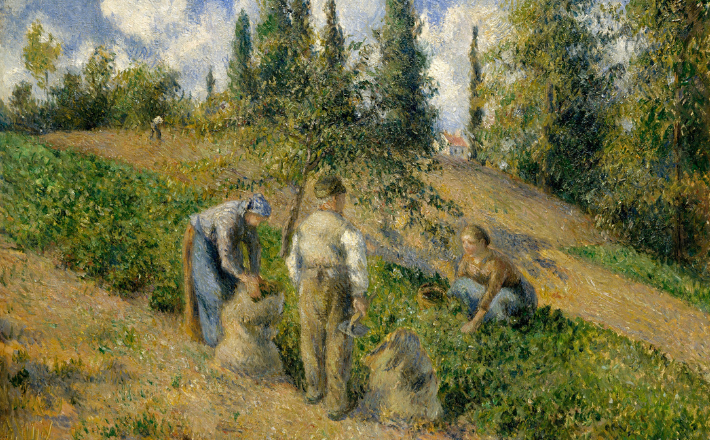Commentary on Psalm 66:1-9
This is a psalm about God’s awesome deeds for the people of God.1
Overhearing the psalm is the universe, which the congregation assumes will join the chorus of God’s awesomeness once they recognize the actions of the Lord for Israel and for all creation.
Israel’s chosenness
Specifically, this psalm sings of how God kept Israel secure and gave Israel a new land. For this reason, it is right to give Yahweh thanks and praise. Exodus is recalled: “God turned sea [yam] into dry land; the river [nahar] they crossed on foot” (verse 6).
Yam and Nahar are the names of the personalized cosmic powers whom the Canaanite god Baal overthrows in the ancient myth of Baal’s ascent to kingship over nature.2 According to the psalmist, these events are revelation of Yahweh’s rule over all nations, not just Israel. Wouldn’t you want to be in cahoots with this God?
American chosenness? A word of caution
Locating this text in the United States civic calendar on the Sunday closest to Independence Day creates a tricky situation for the preacher. Substituting Israel’s story for the story of European Protestant exodus from persecution to freedom is a pretty easy move. “Just as God parted the Red Sea to free Israel, so too did God offer safe passage across the Atlantic for the founding fathers. Just as Israel was destined to take over Canaan, so too the Pilgrims were destined to take the New World from its indigenous peoples.” Yikes. Can of worms opened.
Should you choose to preach from this psalm today, here is my suggestion: In order to avoid preaching a white supremacy sermon dressed up as a manifest destiny sermon, you may want to ignore the suggested pericope from the Revised Common Lectionary, which ends at verse 9. Instead, muddy the waters a bit by moving the reading through verse 12.
Praise for deliverance and discipline
For one, the general hymn of praise embedded in this psalm runs through verse 12.3 While the selection of verses 1–9 is pure, uncomplicated praise, the three omitted verses that go along with the general hymn are complicated. The tone shifts from “thunderous unanimous praise” to “sober reflection on the fact that the touch of the hand of God … is not discovered merely in portent and protection.”4 Discipline can also teach us (as a congregation, as a nation, as humanity) about God.
Why are verses 10–12 left out of the pericope? Perhaps due to the difficult implicit theology of the text as it claims that the trials of a wayward people—as lions caught in a net or trammel (not easy preaching material); or as people riding over God’s people (slightly easier to preach)—were set up by God in judgment and for the refinement of God’s people. What happens if your congregant reads past verse 9 and dives into this section on their own? What happens when we don’t discuss the need for discipline in our growth as Christians?
The point of these verses may also be to say to nations looking over their shoulders at Israel’s hard times: This does not contradict God’s power over all nations and creation. We were refined by these afflictions, and God brought us through to a spacious place and so into new life.
Remembering to renew
Any nation that hopes to stand in the congregation of the world and embody the awesomeness of God in any sort of evangelical or “city on a hill” kind of way must get back to the roots of God’s will for humanity (and the preacher must be clear about the gospel):
- to be a nation that loves justice, mercy, and walking humbly with God;
- to be a nation that cares for immigrants, widows, and orphans;
- to be a nation that practices Sabbath and jubilee, so that people and land may be restored into producing more good fruit.
As a citizen of the United States of America, I lament that we have not yet arrived to that good and spacious land where all can breathe and glorify their Creator. I lament, too, the tragic origin story of this nation and the ways Christ was weaponized to enforce a New World. So as a preacher, I suggest you exhort the congregation to live into God’s awesomeness, proclaiming the redemption story of this nation and world as far from complete. But offer steps seriously imaginable enough to keep the congregation from remaining in a comfortable paralysis.
Notes
- Commentary previously published on this website for July 7, 2019.
- James L. Mays, “Psalms,” in Interpretation (Louisville: John Knox Press, 1994), 222.
- At verse 13 the psalm shifts to an individual’s personal testimony of thanksgiving to God.
- Edwin McNeill Poteat, “Exposition Psalms 42–89,” in The Interpreter’s Bible in Twelve Volumes (Nashville: Abingdon, 1955), 346.


July 6, 2025